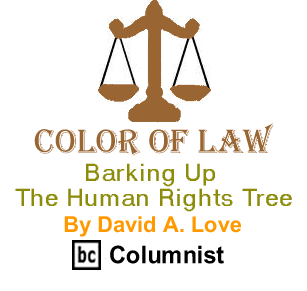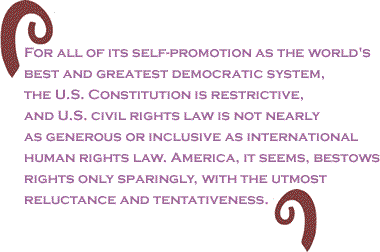"They keep you wrapped up in civil
rights. And you spend so much time barking up the civil-rights
tree, you don't even
know there's a human-rights tree on the same floor.
When you expand the civil-rights struggle
to the level of human rights, you can then take the case of
the black man in this country
before the nations in the UN. You can take it before the General
Assembly. You can take Uncle Sam before a world court. But the
only level you can do it on is the level of human rights. Civil
rights keeps you under his restrictions, under his jurisdiction.
Civil rights keeps you in his pocket. Civil rights means you're
asking Uncle Sam to treat you right. Human rights are some thing
you were born with. Human rights are your God given rights. Human
rights are the rights that are recognized by all nations of this
earth. And any time any one violates your human rights, you can
take them to the world court. Uncle Sam's hands are dripping
with blood, dripping with the blood of the black man in this
country. He's the earth's number-one hypocrite."
The
Ballot or the Bullet
Malcolm X, Cleveland, Ohio, May 3, 1964
Click
here to listen to the speech.
Those of us who use civil rights law as a tool for social and
racial justice are dealing with a useful tool, but a flawed tool
of limited capabilities. America's legal system can be utilized
to bring about change up to a certain point.
At the same time, there are a host of international human rights conventions
and treaties to which the United States is a signatory. Yet, America does not
seem to live up to these international standards. For all of its self-promotion
as the world's best and greatest democratic system, the U.S. Constitution is
restrictive, and U.S. civil rights law is not nearly as generous or inclusive
as international human rights law. America, it seems, bestows rights only sparingly,
with the utmost reluctance and tentativeness. This reflects the schizophrenic
nature of the country: one with great promise, yet a legacy of the denial of
rights to many, and the bestowing of rights only through struggle, social upheaval,
bloodshed and martyrdom.
Meanwhile, the Bush criminal enterprise uses the apparatus of power to engage
in the wholesale denial of our civil rights and civil liberties. Domestic spying,
warrantless wiretaps, kangaroo tribunals and secret prisons, characteristics
of a repressive police state, are the norm. The Justice Department has been
rendered a discredited partisan tool, redesigned to eviscerate the voting rights
of the poor and citizens of color, and to deliver victory to Republican political
candidates. Placing the sworn enemies of civil rights in charge of the department's
civil rights division is about as implausible as allowing fugitive slave catchers
as conductors on the Underground Railroad. And not unlike the cold-blooded
Dred Scott and Plessy courts, those who seek freedom, justice and relief from
oppression should expect nothing but grief and disappointment from today's
Christian conservative Supreme Court.
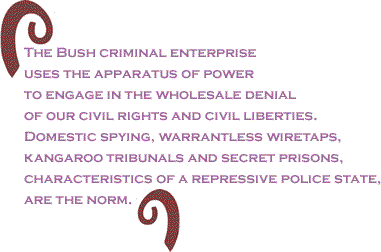
Human rights law offers another way. The International Convention
on the Elimination of All Forms of Racial Discrimination, also
known as the Race
Convention, or
CERD, defines the term racial discrimination as "any distinction, exclusion,
restriction or preference based on race, colour, descent, or national or ethnic
origin which has the purpose or effect of nullifying or impairing the recognition,
enjoyment or exercise, on an equal footing, of human rights and fundamental
freedoms in the political, economic, social, cultural or any other field of
public life."
While the international standard for racial discrimination examines both
the purpose (or intent) and effect of the discrimination, the U.S. constitutional
standard cares only about purpose. In a nation rife with institutional racism
from its inception, one which engages in the criminalization of race, proving
intent without being able to show the effect is a difficult standard. In other
words, if someone has violated you, you have to prove that the person meant
to do it, but you can't discuss its impact on you. The deck is stacked against
you in the process.
Through its institutional practices, the U.S. violates human rights law
as a matter of course. American jurisprudence fails to acknowledge the
decisive
effect of slavery, the legal apartheid of the Deep South and the reign of terror
during Jim Crow segregation in today's criminal justice system. It can't get
beyond race because it refuses to get into it. And in many instances, it accepts
racial bias as inevitable, and knowingly and willingly accommodates bias in
the administration of justice.

America's school to prison pipeline is based upon race, and
youth incarceration is the gateway to adult incarceration.
In a nation whose incarceration rate
for youth is greater than the adult incarceration rate for many countries,
and whose incarceration rate for African American men is greater than that
of apartheid South Africa, Black and Latino youth are far more likely than
their white counterparts to wind up in the system. In many places, one is
hard pressed to find white juvenile inmates in any significant
numbers because they
are not steered toward prison. Black youth are 16 percent of youth, yet 28
percent of those arrested, 40 percent of youth in detention, and 58 percent
of youth in state prisons. It should also be noted that the U.S. is the only
nation that will sentence a 13 year old to a term of life imprisonment. 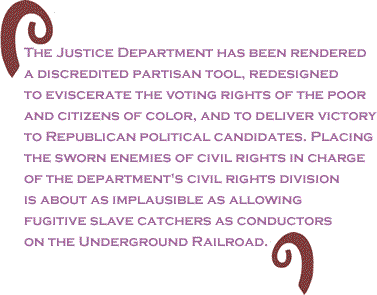
While we decry torture in other nations, the practice is alive
and well in the United States. The ringleader of the Abu Ghraib
abuse scandal in
Iraq learned
the tricks of the trade as a guard at SCI Greene, a state prison in Pennsylvania.
And in Chicago, over 135 African American men were tortured by police in the
1970s and 1980s in order to coerce false confessions. The victims of Vietnam
War-style torture techniques, some of them ended up on death row as a result
of these confessions. Guns were forced into their mouths, bags were places
over their heads, and electric shocks inflicted to their genitals.
And capital punishment is plagued by racial bias. That's because the death
penalty in America is inherently racist. And there's no changing that.
Capital punishment is legalized lynching, the ritualized use of deadly
force to teach the community a lesson. It brings the Jim Crow lynch
mob into the
courtroom, legalizes it, and makes it respectable. The system which administers
death is concerned far more with expediency and finality than with justice,
equity or error for that matter, which explains the 124 innocent inmates exonerated
from death row since 1973.
The single factor which determines who is likely to receive the death
penalty is whether the victim is white. According to Amnesty International,
over the
past 30 years an overwhelming majority of people executed in the U.S.—over
80 percent— were convicted of killing a white victim. African Americans,
however, are about half of all murder victims, and one-third of America's death
row.
It is no mistake that with a few exceptions such as Pennsylvania and California,
the most voracious appetites for the death penalty are found in the former
states of the Confederacy, where eighty percent of executions take place. Oklahoma,
Virginia and Texas alone account for over half of all executions over the past
10 years. And Texas, with less than eight percent of the nation's population
and nine percent of the nation's murders, accounts for 36 percent of all executions
since 1977. Texas is poised to join Louisiana and a few other states by reintroducing
the South's revered tradition of imposing the death penalty for the crime of
rape.
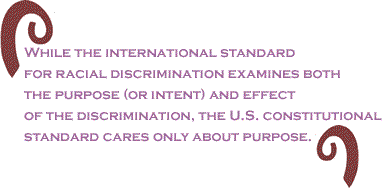
One of the higher profile cases implicating the role of racism
in the application of the death penalty is that of journalist
and former Black
Panther Mumia Abu-Jamal.
Convicted and sentenced to death by a mostly white jury for the 1981 murder
of Philadelphia police officer Daniel Faulkner, the trial judge, Alfred Sabo—who
presided over 32 death row convictions during his career, 24 of which were
reversed— was heard saying "I'm going to help them fry the nigger." The
prosecutor used over two-thirds of his strikes to remove African American jurors,
yet only 20% to 25% of white jurors. Philadelphia's District Attorney's office
very actively employed racist tactics in the jury selection process during
that time. And a 1998 study revealed that, even after accounting for case differences,
the chances of receiving a death sentence in Philadelphia are four times higher
if the defendant is African-American.
Mumia's case has received worldwide attention, and has helped to shed light
on America's inherently racist application of the death penalty. A three-judge
federal appeals court panel recently held a hearing to decide whether Mumia
should be granted a new trial. Will justice be served? Time will tell.
Pondering the problems of race and the law in America, I am reminded of
remarks by attorney Bryan Stevenson, Executive Director of the Equal Justice
Initiative
of Alabama. Stevenson recently told attendees at a human rights conference
at American University's Washington College of Law that he became accustomed
to wearing a nametag with the word "attorney" while in the courtroom.
Given that the defendant is typically the only Black face in a courtroom, and
Stevenson was often mistaken for the defendant, he felt that this step was
necessary.
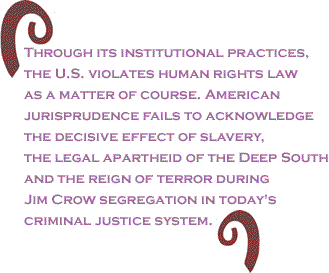
The international human rights legal arena may be the last best
hope for those who seek justice at home. Although "lady justice" sits
on courthouse steps throughout the country holding scales and wearing a
blindfold, the scales
are often rigged and the blindfold has a peephole. Malcolm was on point 40
years ago when he identified the need to seek human rights rather than mere
civil rights. It is just unfortunate that little has changed, and his words
are just as poignant today as they were back then.
BlackCommentator.com Columnist David A.
Love is an attorney based in Philadelphia, and a contributor
to the Progressive
Media Project and McClatchy-Tribune
News Service. He contributed to the book, States of
Confinement: Policing, Detention and Prisons (St. Martin's
Press, 2000). Love is a former spokesperson for the Amnesty
International UK National Speakers Tour, and organized the
first national police brutality conference as a staff member
with the New York-based Center for Constitutional Rights. He
served as a law clerk to two Black federal judges. Click
here to contact Mr. Love. |

